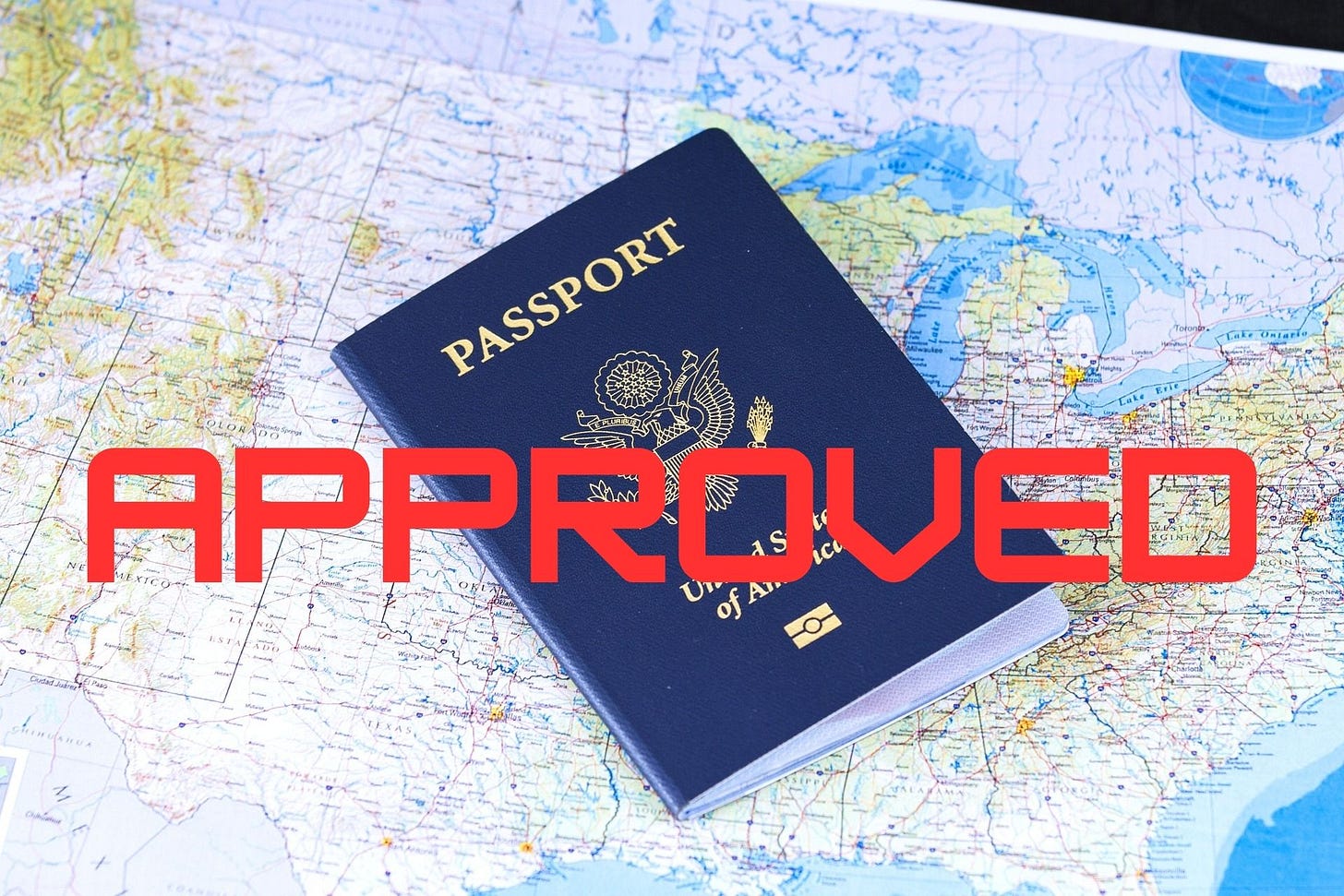3 Visas to Consider
And three more that may be a possibility...
While Americans can travel to many countries for 90 days as a tourist, to stay longer, a visa may be required. In this post, we will review the most common categories of visas and how to determine which might be right for you.
Not These
There are three ways US citizens can live abroad that we will not review in this post:
Each year, approximately 170,000 US citizens study abroad. If you want to go to college in the UK, Germany, Greece, etc. you will need a student visa. 1
If you have specialized training (e.g. as a healthcare professional) you may qualify for a highly-skilled worker visa. There are currently 7 EU countries offering such visas.
Finally, some may jump straight to citizenship in another country by virtue of their parents, grandparents, or even great-grandparents (in a few cases). If you think this may apply to you, begin your research here.
Remote Worker Visa
The Covid pandemic changed the way many people work. As a result, more countries are offering remote worker visas each year. If you are over 18, have a job that you can do anywhere in the world, and can prove the required monthly income, you can apply for a “digital worker” visa. The amount you must earn varies by country.2 In addition, most countries will require you to prove you have savings. But working as a digital nomad has many benefits:
These visas typically offer a pathway to citizenship;
Typically these visas allow you to stay in the country for one to two years and can be renewed.
Assuming you meet the income requirements, countries will allow you to bring your spouse and children.
Earning a US salary in a country with a lower cost of living will allow you to travel or save more.
Of course, applying for a digital worker visa will take a few months. Each country will have a different application process and fees. Many countries, e.g. Portugal, utilize a third party (vfsglobal) to assist them in processing the applications. The items required to submit your application may be confusing … and at times, seem overwhelming. Many will find it easier (and less stressful) to work with a company that specializes in these services.
If you are coming to Portugal, we recommend Relocate to Portugal. This company assisted Denise and me and has continued to assist us in residency matters since we landed. You can read my recent interview with its founder, Gail Aguiar, here.
Passive Income/Retiree Visa
Many countries also offer retiree or passive income visas. These programs allow individuals or couples who can prove a stable income stream to live in a country without becoming a financial burden on the host nation.3 You may qualify if you have rental income, a pension, social security income, or investment income. To find what countries offer such visas, simply Google “what countries offer retirement visas to US citizens”. You will find dozens of articles. Here is just one from Forbes magazine. If you would rather not read, there are dozens of videos on YouTube.
As I mentioned before, not everything you read or watch on the internet is 100% accurate. (Several posts on this site written in 2021 have out-of-date information.) You will want to research each country using various sources and pay close attention to when the post you are reading was published. Keep in mind that vfsglobal also processes many of these visas. If you find a country that looks interesting, you might want to check if vfsglobal has information on that country.
If the application process seems too daunting, relocation companies can assist. When exploring this option, permit me to offer some advice:
Interview more than one company as services and fees vary widely.
If possible, get a recommendation from someone who does not get financial remuneration from the company they recommend.4
Finally, remember these companies can only assist you in the process. They cannot do everything for you. You will have to print out your financial documents, get your fingers printed, submit paperwork for a FBI background check, etc. They will guide you through the process, typically review the application for completeness, and hold your hand. Some have contacts within the immigration system, enabling them to keep you apprised of the process.
Golden Visa
Finally, surprise … surprise, money makes it easier. Some countries offer Golden Visas or Investment Visas. When we moved to Portugal in 2020, we could have purchased a home near the beach for €500,000, jumped through a few bureaucratic hoops, paid some additional application fees, and earned a Golden Visa. Many Americans, Chinese, Russians, etc, did just that. However, today, the EU frowns on such visas as they fear they promote money laundering. Also, many believe this practice caused home prices in Portugal to rise causing a housing crisis for its citizens.
As a result, Portugal has since revised its requirements for such a visa. Instead of real estate, one must invest in a heritage project, business, or investment fund. So, Golden Visas are not dead … but the minimum requirements change from time to time.
Many countries offer Golden Visas. For example, today, you could move to the South Pacific island of Vanuatu for as little as $138,000. If you want a Golden Visa in Spain it will cost you €500,000. If you think this may be an option, this website may be a good place to start.
I hope you have found this information helpful. Next, we finish this special series with information for those interested in moving to Portugal. Thanks for reading and sharing ExpatInPortugal with your friends and family.
Fica bem, até à próxima vez,
Nanc
Due to the ridiculous cost of higher education in the States, an American friend sent their daughter to St Andrews University. Not only did she get a great education and a marvelous living-abroad experience…but her education costs (including flights back to the US to visit the folks) were less expensive than a comparable US university.
For example, in Spain, you must show a monthly income of €2,400/month. In Portugal, you are required to earn €3,280/month. In Estonia, it goes up to €4,500/month.
Portugal lost approximately 1 million citizens during the 2008 financial crisis (9% of its population). Young Portuguese workers moved to other EU countries where they could earn more. While there have been changes in Portugal’s Golden Visa and NHR program since this post was written, you can better understand the economic forces of such migration here.
While we have been approached by many companies that want us to recommend them…we only recommend companies we have personally worked with and NEVER ACCEPT ANY MONEY OR SERVICES from these companies.






Just a caution about the visa information as it relates to Portugal: VFS Global isn't singularly the processor for the Digital Nomad (D8) visa and no income, at all, is needed for the Passive Income or Retirement Visa (D7)....passive means that assets fully qualify an applicant. This data and more is always available for free, updated and more accurate than any other resource, at Americans and Friends in Portugal.
At least for the digital nomad visa (and maybe for the others?), Spain and I'm sure many/most of the other countries require you to submit a criminal background check. If you've ever been arrested (regardless of the disposition of the case; even if your record was expunged), you should get out ahead of this and check yourself out NOW. These reports are often inaccurate and you'll want to clear that up well in advance of trying to move abroad.